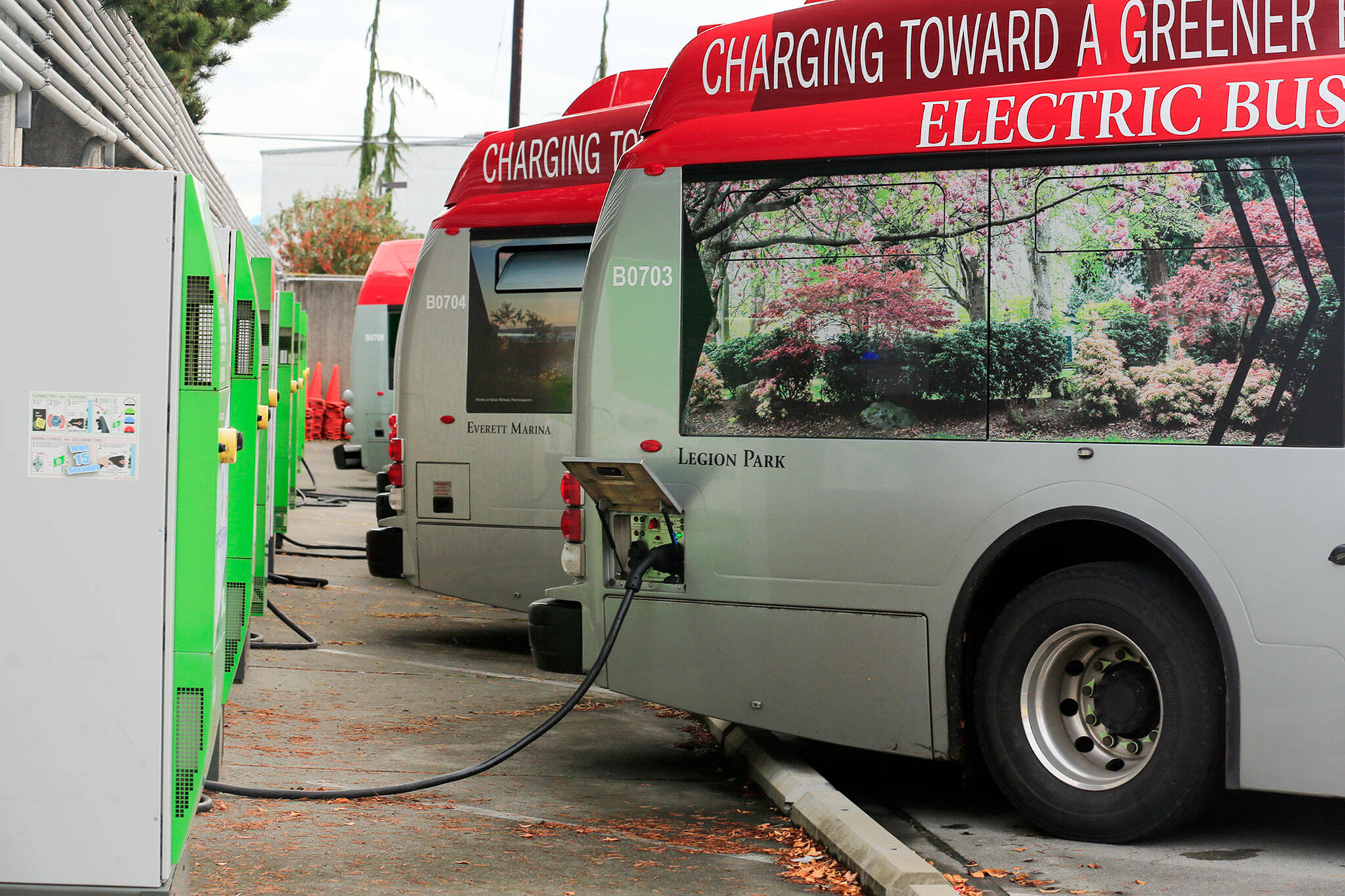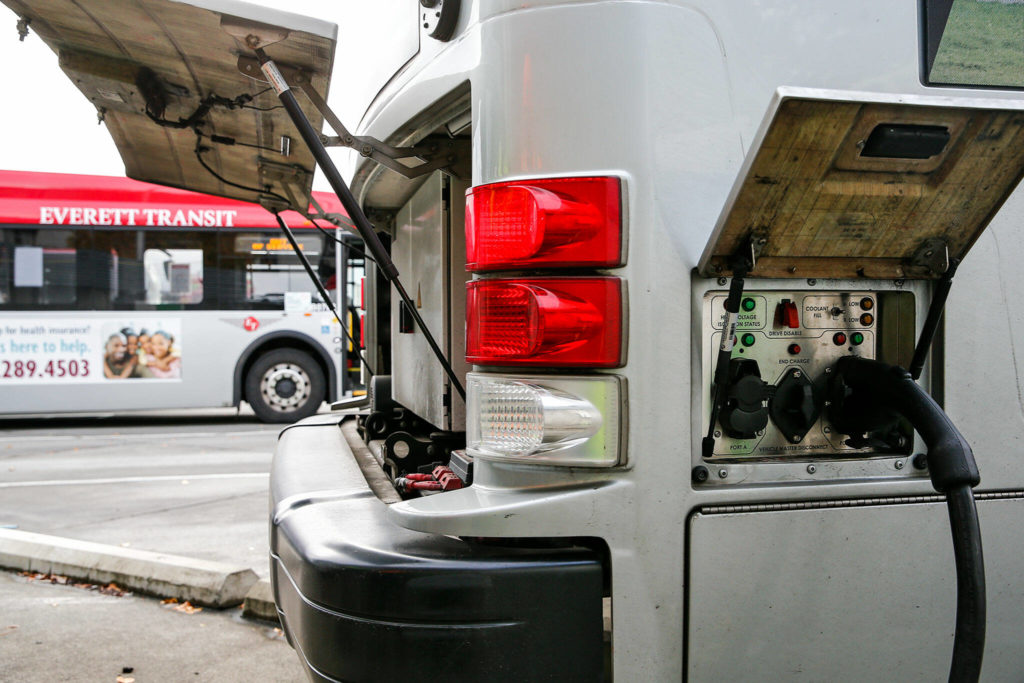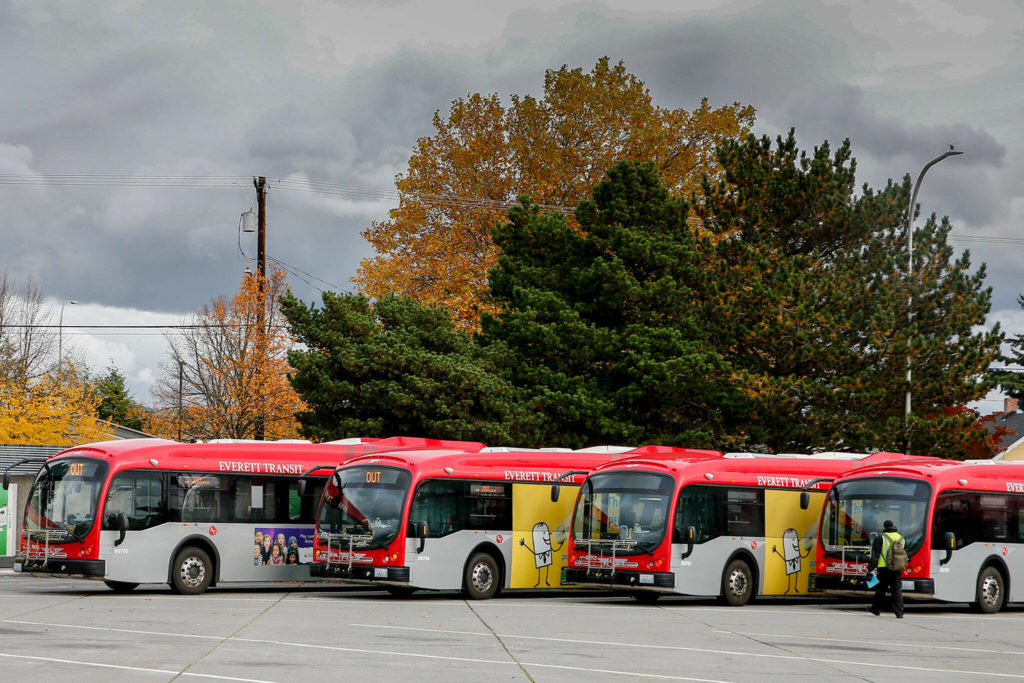Everett’s air could be a little cleaner and its electric buses could be more effective next year thanks to a bundle of state investments.
Seven inductive charging stations are planned for installation by the city’s transit agency and the county utility district. Two plug-in electric vehicle charging stations are set for semi-public use at Hopeworks Station on Broadway.
Everett Transit is set to buy and install six inductive charging stations by the end of 2022.
Another unit, courtesy of the Snohomish County Public Utility District, is set for Everett Transit’s riverfront to waterfront bus route. Route 6 resumed service Sunday after it was a casualty of pandemic budget cuts last year.
“That will be the first inductive charger, certainly for buses, in Snohomish County,” Everett Transit director Tom Hingson said.
All projects are funded largely by other agencies.
Everett was one of eight transit agencies to get funding from the $16.5 million Green Transportation Capital grant set by the Legislature. The Washington State Department of Transportation awarded the city $1.92 million for six wireless charging stations through the program.
“It helps generally to reduce emissions statewide,” WSDOT grants analyst lead Evan Olsen said. “The citizens of the Everett have wanted this for a while.”
Those stations were planned for College Station, Everett Station, and either Everett Mall or the Seaway Transit Center near Boeing.
The Snohomish County PUD won over $864,000 in state Department of Commerce grants for charging stations at the planned Eclipse Mill Park in the Riverfront development and at Hopeworks Station II.
Last week the Everett City Council unanimously authorized Mayor Cassie Franklin to sign the agreements.
Everett Transit is expecting to take delivery of nine new Gillig electric buses by the end of 2022. Each will be capable of wireless charging. Nine battery electric buses already in the city’s fleet instead charge usually overnight while plugged in along the wall of the transit depot on Cedar Avenue.
Fully charged, Everett Transit electric buses have 150 to 200 miles of range. It usually means about eight or nine hours of route service per bus. But the agency’s operations standard is for the bus to return to the depot when the battery has at least 20% of its charging capacity.
Inductive charging works similar to wireless charging for smartphones. Buses can park above the in-ground wiring and charge there while waiting for a new driver or during a layover period. That can keep an electric bus in service almost indefinitely.
“We’ll be able to change our model from working a bus until it gets to a certain depletion and then bringing in the bus for the day,” Hingson said. “All the productivity will be out in the field.”
That includes for the environmentally sensitive areas served by Everett Transit Route 6. It runs along the Snohomish River and Port Gardner.
Those neighborhoods have been served by diesel or diesel hybrid buses. Like other vehicles that run on gasoline and oil, Hingson said “diesel buses can leak.” Those fluids can enter stormwater drains and be treated, or they can take enter the ground and eventually pollute water, in addition to exhaust emissions that contribute to global warming. Electric buses don’t emit greenhouse gases while operating.
Transportation accounted for 29% of U.S. greenhouse gas emissions, according to the Environmental Protection Agency. Of that amount, over half of the emissions came from light-duty vehicles such as passenger cars.
Helping pay for electric vehicle charging stations at HopeWorks, a 65-unit housing facility for people who had been homeless, and on the Everett Transit route along the waterways provides equity for residents “historically underserved” by the zero-emissions vehicles.
But the PUD wants to examine how a larger shift to electric vehicles and the charging that comes with it could affect its system, and thus its customers.
“Our specific interest, beyond just supporting electric transportation, is understanding how these things impact the grid,” PUD senior program manager Suzy Oversvee said.
The PUD could implement demand charges for high-volume energy users. Another idea is to help customers with the additional energy bill costs that would come with plugging in a electric car. Instead of charging at peak use hours, customers could plug in later at night for lower rates.
“We also hope that what we learn from this project can apply beyond Everett Transit, including school districts and others with transit fleets,” Oversvee said.
Have a question? Call 425-339-3037 or email streetsmarts@heraldnet.com. Please include your first and last name and city of residence.
Talk to us
> Give us your news tips.
> Send us a letter to the editor.
> More Herald contact information.



























